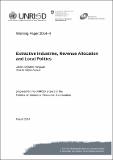| dc.contributor.author | Arellano Yanguas, Javier | |
| dc.contributor.author | Mejía Acosta, Andrés | |
| dc.date.accessioned | 2014-10-06T09:47:43Z | |
| dc.date.available | 2014-10-06T09:47:43Z | |
| dc.date.issued | 2014-03-03 | |
| dc.identifier.uri | https://opendocs.ids.ac.uk/opendocs/handle/20.500.12413/4665 | |
| dc.description.abstract | The success of a developmental strategy based on the extraction of non-renewable resources is largely dependent on the share of revenues captured by the state from the extractive sector and the modalities that governments adopt to use and distribute those revenues. In the last two decades, local populations and subnational governments have demanded a greater decentralisation of extractive industry (EI) related revenues but the modalities and mechanisms adopted varied widely across cases.
This paper looks at the existing criteria and reform modalities adopted to allocate and use EI revenues, and examines the political bargains that enabled such distribution. The paper focuses on four specific questions: a) How do central governments share (or distribute) the revenues from extractive industries with different levels of subnational government (vertical distribution)?; b) How do governments distribute EI revenues across extractive and non-extractive jurisdictions at subnational level (horizontal distribution)?; c) Which are the mechanisms and rules adopted by governments to allocate these resources?; and d) What is the bargaining potential of subnational territories to demand a more proportionate share of revenues? | en_GB |
| dc.description.sponsorship | UNRISD and SDC | en_GB |
| dc.language.iso | en | en_GB |
| dc.publisher | UNRISD | en_GB |
| dc.rights.uri | http://www.ids.ac.uk/files/dmfile/IDSOpenDocsStandardTermsOfUse.pdf | en_GB |
| dc.subject | Governance | en_GB |
| dc.title | Extractive Industries, Revenue Allocation and Local Politics | en_GB |
| dc.type | Series paper (non-IDS) | en_GB |
| dc.rights.holder | UNRISD, SDC and IDS | en_GB |
| dc.identifier.team | Governance | en_GB |

